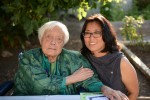When UCLA alumna Grace Lee met 98-year-old Grace Lee Boggs, she knew she had found something revolutionary.
According to Lee, Boggs, a Chinese-American social activist, played a leading role in social movements that swept through Detroit during her lifetime, including the Black Power, Civil Rights, feminist and labor movements.
Boggs’ rich history fascinated Lee – what was originally meant as a two-hour interview turned into a five-day conversation between Lee and Boggs.
This conversation ultimately became the core of “American Revolutionary: The Evolution of Grace Lee Boggs,” a documentary that won the 2013 L.A. Film Festival Audience Award for Best Documentary Feature. The film will screen Wednesday at 8 p.m. at UCLA’s James Bridges Theater.
Lee’s film explores Boggs’ life and philosophy as well as the various social movements in which she played a part. Although Lee met Boggs in 2003, she did not feel prepared to shoot a documentary on Boggs’ rich history until a few years later.
“It wasn’t until 2008 when I realized I really wanted to sink my teeth into something meaty, because the film really looks at sort of the evolution of ideas, and her ideas, and philosophy, and history and all kinds of stuff like that,” Lee said.
Lee said that revolution and evolution are two main ideas in the film since Boggs became involved in several social movements throughout the 20th century.
“Typically we think of a violent, bloody sort of revolution, and at one point in her life she may have thought that way,” Lee said. “But how the idea of revolution evolved … through all these movements is what we try to explore in the film.”
In order to examine these historical events, the film uses extensive archival footage as well as animations to illustrate Boggs’ thought processes. Associate producer of the film and UCLA alumna, Eurie Chung was in charge of locating relevant archival tapes and digitizing them for the film.
“It was like trying to craft the story of U.S. history that she was involved (with),” Chung said. “If you don’t want to just watch her talk for 90 minutes, you really have to find the stuff to wrap up the picture of history that you’re trying to make with her.”
The film also contains interviews with people in Boggs’ community who tell the story of what happened in Detroit and its various movements. Because her husband was an autoworker in the city, Boggs wanted to organize a social revolution for autoworkers.
According to Lee, Boggs was a part of the thriving black community in Detroit, but as a Chinese-American woman, she was also apart from the community.
Lee said that part of her motivation to create the film was so she could spend time with someone who lived through and created history.
“We don’t take the time to actually get to know our elders that way, and it was a really rewarding experience — not just because she’s a fascinating person but because you get to experience the past through her eyes,” Lee said.
Cinematographer and UCLA alumna, Quyen Tran shot the majority of the footage of Detroit in the film, as well as Lee’s more recent interviews with Boggs. Tran said she believes the film also highlights the importance of documenting lesser-known activists like Boggs.
Tran said, “(Boggs) has done so much for not just the Asian American community, but the black community (as well), and you just realize there are some really amazing people out there. And I think it’s a shame that more people aren’t profiled in documentaries.”
Producer Austin Wilkin said his main reason for working on the film was to draw more attention to Boggs’ story.
Wilkin said, “I think Grace Lee Boggs is such a phenomenal person, and I think the message, although her day-to-day life is really rooted in Detroit, is for everyone. ... It’s the evolution of thinking that I really wanted to help get out there.”
Tran said that although Boggs’ philosophy can be heavy at times, the film remains accessible.
“Grace Lee Boggs is an incredible character, but I didn’t know who she was until I worked with this film,” Tran said. “Anyone can relate to it. … Anyone would be interested in her philosophy.”
